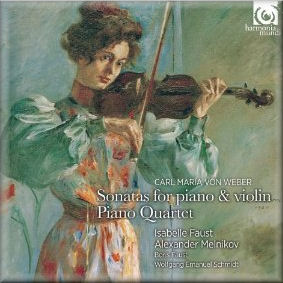 |
 |
| 
Support
us financially by purchasing this disc from: |
|
|
|
|
|
Carl Maria von WEBER
(1786 - 1826)
Violin Sonatas Op. 10 (1810): No. 6 in C Major [8:54]; No. 3 in
G Major [4:39]; No. 4 in E Flat Major [6:06]; No. 2 in G Major [7:58];
No. 5 in A Major [8:08]; No. 1 in F Major [7:49]
Quartet for violin, viola, cello and fortepiano, Op. 8 1806 [26:35]
 Isabelle Faust (violin); Alexander Melnikov (fortepiano); Boris
Faust (viola); Wolfgang Emanuel Schmidt (cello)
Isabelle Faust (violin); Alexander Melnikov (fortepiano); Boris
Faust (viola); Wolfgang Emanuel Schmidt (cello)
rec. June 2011, Berlin, Germany. DDD
 HARMONIA MUNDI HMC 902108 [70:11]
HARMONIA MUNDI HMC 902108 [70:11]
|
|
|
Weber is a difficult composer to categorise. Pay more than mere
cursory attention to his small corpus of chamber music, for
instance, and all sorts of delights emerge. That broadening
of appreciation seems to be the impetus behind the sprightly
yet intelligent, colourful yet reflective performances on this
new Harmonia Mundi CD.
Weber's output consists of over 300 compositions. Generalisations
can perhaps be forgiven. Just to listen to the choruses at the
ends of some of the scenes of Weber's operas is to appreciate
his role as a shaper of the wider German Romantic aesthetic.
So, too, the emotion, concentration and self-awareness of this
intimate music for strings and keyboard is its own deep and
exciting world. On the present CD Alexander Melnikov's
'Lagrassa' fortepiano from 1815 Vienna sounds
splendidly rich and trenchant. Let yourself be drawn into the
Rondo of the fourth sonata of Op. 10 [tr.7], for instance. There's
pathos, precision and plenty of surprises as well as delicacy
of melodic and harmonic idea.
The Piano Quartet is similarly opulent. Listen for example,
to the way in which melodic ideas tumble over one another, mellow
textures compete and harmonies lead to and from resolution in
the first movement alone [tr.8]. It could have been written
by Mendelssohn. Yet it has the crystal punchiness of the purely
Classical style with as much emotional power as Mozart.
By letting the lines of the music with its forward-moving and
upward-facing architecture lead them, these superb musicians
don't have to work very hard to squeeze every last drop
of expression from the Quartet.
There are also quiet and darker, sumptuously intimate and gentle
moments. The opening of the Quartet's second, adagio,
movement [tr.9], for example poises, pauses, presses then loosens
the otherwise all but traumatic grip it has on the ear without
ever verging on the melodramatic. Its emotional essence is brought
out so naturally and effortlessly by these players. Mozartian,
again.
Isabelle and Boris Faust, Melnikov and Schmidt play as a family.
They are happy in the idiom, have that gift of seeming to be
discovering the music as they play it on this recording yet
are professional and technically expert to the core. They have
the immediacy of much younger players eager to advocate a new
enthusiasm for a newly discovered composer. The studio recording
has the presence and edge of a public recital.
There is only one other recording (the Gaudier Ensemble on Hyperion
CDA67464) of the Piano Quartet; and none in the current catalogue
of the Op. 10 Sonatas. So these engaged and communicative musicians
are breaking new ground. Yet there's not a wayward note,
an indulgent tempo or an excessively-expressed phrase from first
to last. There's consistency, shot through with delight
and transparent with grace in the way in which each movement,
each new musical idea of Weber's is exposed. Generally,
the tempi are lively, though not hurried. The subtleties breathe
and unfold crisply with an almost filigree precision that is
never over-elaborate. Listen to the end of the Quartet's
fourth movement [tr.11], for example: Weber has said, developed
and summed up all he wants to say. The players never announce
anything. They simply bring to the music's development
an appropriate minimum of narrative as well as total involvement.
The same goes for Isobelle Faust and Melnikov as they 'return'
to the Sonatas after the Quartet. This is placed at the centre
of the sequence of pieces; a great idea. The variation continues
too: the second movement, adagio, of the Second Sonata [tr.
13], for example, is so gentle, understated and reticent as
almost to suggest silence itself. The players are not winking
at us listeners as they play; yet they surely know we're
watching and listening. They rightly expect us to be as taken
with the enticing rigour and excitement of Weber's music
as they are.
The acoustic is just right: close but not overbearing. The aural
experience is enhanced by the miking. The booklet has useful
information on Weber, the players and the works. This is music
that deserves to be better known. It has qualities of beauty,
clarity - and a velvet crunch - that go a long way towards abstracting
it from any epoch. The gift that Isobelle and Boris Faust, Melnikov
and Schmidt have is to play in a way that's both conscious
of that abstraction and at the same time which revels in the
conventions of early nineteenth century Romanticism such that
the very essence of the music is present from start to quizzically
determined finish.
Mark Sealey
Support
us financially by purchasing this disc from: |
|
|
|
|
|
|












